- Home
- Dennis Lehane
Prayers for Rain Page 7
Prayers for Rain Read online
Page 7
As I walked up the slate path that led to the Dawes’ front door, they opened it wide, stood with arms slung around each other’s lower backs and waved to me like Robert Young and Jane Wyatt on a nineteen-inch black-and-white.
“Mr. Kenzie?” Dr. Dawe said.
“Yes sir. Good to meet you.” I reached the doorway and received two firm handshakes.
“How was the drive?” Mrs. Dawe said. “You took the Pike, I hope?”
“Yes, ma’am. It was fine. No traffic.”
“Terrific,” Dr. Dawe said. “Come on in, Mr. Kenzie. Come on in.”
He wore a faded T-shirt over rumpled khakis. His dark hair and trim goatee were flecked with distinguished gray and he had a giving smile. He didn’t fit my image of the mercurial Mass General surgeon type with the bulging stock portfolio and a God complex. He looked more like he should be giving a poetry reading in Inman Square, sipping herbal tea and quoting Ferlinghetti.
She wore a black-and-gray-checkered oxford over black stretch pants and black sandals, and her hair was a lustrous dark cranberry. She was at least fifty, or so I assumed given what I knew about Karen Nichols, but she looked ten years younger and in her casual clothes made me think of a college girl at her first sorority sleepover, drinking wine from the bottle and sitting cross-legged on the floor.
They whisked me through a marble foyer bathed in amber light, past a white staircase that curved gracefully up and to the left like a swan craning its head, and into a cozy dual office space with exposed cherry beams on the ceiling, muted Orientals on the floor, and a sense of aged plumpness in the leather captain’s chairs and matching sofa and armchairs. The room was large, but it seemed small at first, because it was painted a dark salmon and precisely stuffed with books and CDs and a triumphantly kitschy half canoe that had been stood upright and turned into a case to hold knickknacks and paperbacks with weathered spines and a row of actual 33 1/3 rpm albums, mostly from the sixties—Dylan and Joan Baez sharing space with Donovan and the Byrds; Peter, Paul & Mary; and Blind Faith. Fishing rods and hats and painstakingly detailed model schooners shared space on the walls and the shelves and desktops, and a faded farm table stood behind the couch under what I believe were original paintings by Pollock and Basquiat and a lithograph by Warhol. I had no problem with the Pollock and Basquiat, though I’d never replace the Marvin the Martian poster in my bedroom with either of them, but I sat in a position so I wouldn’t have to look at the Warhol. I think Warhol is to art what Rush is to rock music, which is to say, I think he sucks.
Dr. Dawe’s desk occupied the west corner, the hutch piled high with medical journals and texts, two of the model ships, microcassettes forming a pile around a microrecorder. Carrie Dawe’s sat in the east corner, clean and minimalist save for a leather-bound notebook with a sterling silver pen on top and a creamy stack of typewritten paper to its right. Upon a second glance I realized both desks were handmade, constructed of Northern California redwood or Far Eastern teak, it was hard to tell in the soft, diffused light. Using the same process one used to build log cabins, the wood had been hand-carved and laid in place, then left to age and expand for a few years until the pieces melded to one another with more adherence and strength than could ever be accomplished with sheet metal and a blowtorch. Only then would it be sold. Through private auction, I’m sure. The faded farm table, upon second glance, wasn’t faux rustic, it was truly rustic and French.
The room might have said cozy, but it said cozy with exquisite taste and a bottomless wallet.
I sat on one end of the sofa and Carrie Dawe took the other end, sitting cross-legged, as I’d somehow known she would, idly straightening the tassels on the summer afghan thrown over the back of the sofa as she considered me with soft green eyes.
Dr. Dawe settled into one of the captain’s chairs and wheeled it over to the other side of the coffee table between us.
“So, Mr. Kenzie, my wife tells me you’re a private investigator.”
“Yes, sir.”
“I don’t think I’ve ever met one before.” He stroked his goatee. “Honey?”
Carrie Dawe shook her head and crooked her index finger at me. “You’re the first.”
“Wow,” I said. “Gosh.”
Dr. Dawe rubbed his palms together and leaned forward. “What was your favorite case?”
I smiled. “There’ve been so many.”
“Really? Well, come on, tell us about one.”
“Actually, sir, I’d love to, but I’m slightly pressed for time and if it wouldn’t trouble you both too much, I’d just like to ask some questions about Karen.”
He swept his palm out over the coffee table. “Ask away, Mr. Kenzie. Ask away.”
“How did you know my daughter?” Carrie Dawe asked softly.
I turned my head, met her green eyes, saw a glint of what might have been grief slide along the sheen of the pupils before vanishing.
“She hired me six months ago.”
“Why was that?” she asked.
“She was being harassed by a man.”
“And you made him stop?”
I nodded. “Yes, ma’am, I did.”
“Well, thank you, Mr. Kenzie. I’m sure that helped Karen.”
“Mrs. Dawe,” I said, “did Karen have any enemies?”
She gave me a bewildered smile. “No, Mr. Kenzie. Karen was not the type of girl who made enemies. She was far too innocuous a creature for that.”
Innocuous, I thought. Creature, I thought.
Carrie Dawe tilted her head in the direction of her husband and he picked up the ball.
“Mr. Kenzie, according to the police, Karen committed suicide.”
“Yes.”
“Is there any reason we should doubt the soundness of their conclusion?”
I shook my head. “None, sir.”
“Uh-huh.” He nodded to himself and seemed to drift for a minute, his eyes floating across my face and then around the room. Eventually he looked back into my eyes. He smiled and patted his knees as if he’d come to some sort of definitive decision. “I’d say some tea would be nice about now. Wouldn’t you?”
There must have been an intercom system in the room, or the help waited right outside the door, because no sooner had he said it than the office door opened and a small woman entered holding a service tray with three delicate, brass Raj tea sets on top.
The woman was in her mid-thirties and dressed simply in T-shirt and shorts. Her hair was short and dull brown and rose in Astroturf spikes from her skull. Her skin was very pale and very bad, cheeks and chin sprayed with acne, neck blotchy, exposed arms dry and flaky.
She kept her eyes down and deposited the tray on the coffee table between us.
“Thank you, Siobhan,” Mrs. Dawe said.
“Yes, ma’am. Will there be anything else?”
She had a brogue thicker than even my mother’s had been. Will came out wail, there as thur, else as ailse. It only gets that thick in the North, in the gray cold towns where the refineries stand and the soot hovers like a cloud.
The Dawes didn’t answer. They studiously removed the three parts of their respective Raj tea sets, the cream in the tin on top, the sugar below, the tea itself at the bottom, and fixed their drinks in cups so delicate I’d be afraid to sneeze in the same area code.
Siobhan waited, casting a quick furtive glance from under lowered lids in my direction as the heat rose up her pale skin.
Dr. Dawe finished preparing his tea with a long, scraping stir of the spoon around the edges of the china. He raised it to his lips, noticed I hadn’t touched mine, then noticed Siobhan standing to my left.
“Siobhan,” he said. “Good God, girl, you’re excused.” He laughed. “In fact, you look tired, kid. Why don’t you take the afternoon off?”
“Yes, Doctor. Thank you.”
“Thank you,” he said. “This tea is wonderful.”
She left the room with her shoulders hunched and her back bent, and once she’d closed the door behind
her, Dr. Dawe said, “Great kid. Just great. Been with us pretty much since she stepped off the boat fourteen years ago. Yes…” he said softly. “So, Mr. Kenzie, we were wondering why you’re investigating my stepdaughter’s death if there’s nothing to investigate?” He crinkled his nose over his teacup at me and then took a sip.
“Well, sir,” I said as I lifted the cream container off the top, “I’m more interested in her life, actually, the last six months before she died.”
“And why is that?” Carrie Dawe asked.
I poured some steaming tea into the cup, added a dash of sugar and some cream. Somewhere my mother rolled over in her grave—cream was for coffee, milk was for tea.
“She didn’t strike me as the suicidal type,” I said.
“Aren’t we all?” Carrie Dawe asked.
I looked at her. “Ma’am?”
“Given the right—or should I say, the wrong—circumstances, aren’t we all capable of suicide? A tragedy here, a tragedy there…”
Mrs. Dawe studied me over her teacup and I took a sip from my own before I spoke. Dr. Dawe had been right, it was excellent tea, cream or no cream. Sorry, Mom.
“I’m sure we all are,” I said, “but Karen’s decline seemed, well, drastic.”
“And you base this opinion on intimate knowledge?” Dr. Dawe said.
“Excuse me?”
He waved his cup at me. “Were you and my stepdaughter intimate?”
I gave him what I’m sure was a confused narrowing of my eyes, and he raised his eyebrows up and down gleefully.
“Come on, Mr. Kenzie, we don’t speak ill of the dead around here, but we know Karen’s sexual activities were, well, rampant in the months before she died.”
“How do you know that?”
“She was coarse,” Carrie Dawe said. “She spoke with sudden explicitness. She was drinking, using drugs. It would have been sadder if it weren’t so clichéd. She even propositioned my husband once.”
I looked back at Dr. Dawe and he nodded and placed his teacup back on the coffee table. “Oh, yes, Mr. Kenzie. Oh, yes. It was a veritable Tennessee Williams play every time Karen dropped by.”
“I didn’t see that part of her,” I said. “I met her before David was hurt.”
Carrie Dawe said, “And how did she strike you?”
“She struck me as kind and sweet and, yes, maybe a little too innocent for the world, but innocent just the same, Mrs. Dawe. Not the type of woman who’d jump naked off the Custom House.”
Carrie Dawe pursed her lips and nodded. She looked off past me, past her husband, to a point somewhere high up on the wall. She took a sip of tea that was as loud as boots dropping through autumn leaves.
“Did he send you?” she said eventually.
“What? Who?”
She turned her head back, held me in those cool green eyes. “We’re tapped out, Mr. Kenzie. Mention that, won’t you?”
Very slowly, I said, “I have no idea what you’re talking about.”
She gave me a chuckle so light it sounded like a wind chime. “I’m sure you do.”
But Dr. Dawe said, “Maybe not. Maybe not.”
She looked at him and then they both looked at me and suddenly I was aware of a polite fever in their gazes that made me want to bug out of my skin, throw my skeleton through the window, go clacking like mad down the streets of Weston.
Dr. Dawe said, “If you’re not here to extort, Mr. Kenzie, then why are you here?”
I turned to him and the light in his face seemed more like sickness. “I’m not sure everything that happened to your daughter in the months before she died was accidental.”
He leaned forward, all grave seriousness. “Is it a ‘hunch’? Something in your ‘gut,’ Starsky?” The manic twinkle returned to his eyes and he leaned back. “I’ll give you forty-eight hours to solve the case, but if you can’t, you’ll be walking a beat in Roxbury come winter.” He clapped his hands together. “How was that?”
“I’m just trying to find out why your daughter died.”
“She died,” Carrie Dawe said, “because she was weak.”
“How’s that, ma’am?”
She gave me a warm smile. “There’s no mystery here, Mr. Kenzie. Karen was weak. A few things didn’t go her way, and she cracked under the strain. My daughter, whom I gave birth to, was weak. She needed constant reassuring. She needed a psychiatrist for twenty years. She needed someone to hold her hand and tell her things would be all right. That the world worked.” She held out her hands as if to say Que sera, sera. “Well, the world doesn’t work. And Karen found that out. And it crushed her.”
“Studies have shown,” Christopher Dawe said with his head tilted toward his wife, “that suicide is an inherently passive-aggressive act. Have you heard that, Mr. Kenzie?”
“I have.”
“That it’s meant not so much to hurt the person who kills herself, but to hurt those she leaves behind.” He poured some more tea into his cup. “Look at me, Mr. Kenzie.”
I looked.
“I am a cerebral man. It has brought me no small measure of success.” His dark eyes flashed with pride. “But, being a man of intellect, possibly I’m less attuned to the emotional needs of others. Possibly I could have been more emotionally supportive of Karen as she grew up.”
His wife said, “You did a fine job, Christopher.”
He waved her off. His eyes bore into my own. “I knew Karen never got over the death of her natural father, and in hindsight, maybe I should have worked harder to assure her of my love. But we’re flawed creatures, Mr. Kenzie. All of us. You, me, Karen. And life is regret. So my wife and I will, I promise you, regret often over the coming years the things we didn’t do with our daughter. But that regret is not for the consumption of others. That regret is ours, sir. As this loss is ours. And whatever your odd quest is, I don’t mind telling you, I find it kind of sad.”
Mrs. Dawe said, “Mr. Kenzie, may I ask you a question?”
I looked back at her. “Sure.”
She placed her teacup back on its saucer. “Is it necrophilia?”
“What?”
“This interest in my daughter?” She reached out and wiped her fingers along the top of the coffee table.
“Ah, no, ma’am.”
“You’re sure?”
“Positive.”
“Then what is it, sir?”
“In all truth, ma’am, I’m not really sure.”
“Please, Mr. Kenzie, you must have some idea.” She smoothed the tails of her shirt against her thighs.
I felt awkward suddenly, felt the size of the room shrink around me. I felt powerless. To try to sum up my desire to right wrongs whose victim was well beyond benefiting from my efforts seemed impossible. How do you explain the pulls that dictate and often define your life in a few concise sentences?
“I’m waiting, Mr. Kenzie.”
I raised a helpless arm to the absurdity of it. “She struck me as someone who played by all the rules.”
“And what rules are those?” Dr. Dawe said.
“Society’s, I guess. She worked the job, she opened the dual checking account with her fiancé and saved for the future. She dressed and spoke the way Madison Avenue tells us we’re supposed to. She bought the Corolla when she wanted the Camry.”
“You’re losing me,” Karen’s mother said.
“She played by the rules,” I said, “and she got stomped anyway. All I want to know is if any of that stomping wasn’t accidental.”
“Mmm-hmm,” Carrie Dawe said. “Do you make much money tilting at windmills these days, Mr. Kenzie?”
I smiled. “It’s a living.”
She considered the tea service to her right. “She was buried in a closed casket.”
“Ma’am?”
“Karen,” she said. “Buried in a closed casket because what there was to look at wasn’t fit for public display.” She looked up at me and her eyes shone wetly in the gathering gray of the room. “Even her method of suic
ide, you see, was aggressive, meant to hurt us. She robbed her friends and family of the ability to view her one last time, to mourn her in the correct custom.”
I had absolutely no idea what to say to that, so I kept quiet.
Carrie Dawe gave me a weary backward flutter of her hand. “When Karen lost David and then her job and finally her apartment, she came to us. For money. For a place to live. She was quite obviously doing drugs by this point. I refused—not Christopher, Mr. Kenzie, I—to subsidize her self-absorption and drug use. We continued to pay her psychiatrist’s bills, but I determined that she should otherwise learn to stand on her own two feet. In retrospect, it may have been a mistake. But in the same circumstances, I think I would elect to follow the very same course again.” She leaned forward, beckoned me to do the same. “Does that strike you as cruel?” she asked.
“Not necessarily,” I said.
Dr. Dawe clapped his hands together again, the sound as loud as buckshot in the still room.
“Well, this has just been great! Can’t think of the last time I had so much fun.” He stood, held out his hand. “But, all good things must come to an end. Mr. Kenzie, we thank you for regaling us, and hope it won’t be too many seasons before you and your minstrels return this way again.”
He opened the door and stood by it.
His wife stayed where she was. She poured herself some more tea. She was stirring the sugar in when she said, “Do take care, Mr. Kenzie.”
“Goodbye, Mrs. Dawe.”
“Goodbye, Mr. Kenzie,” she said in a lazy singsong as she poured her cream.

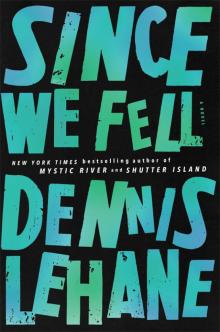 Since We Fell
Since We Fell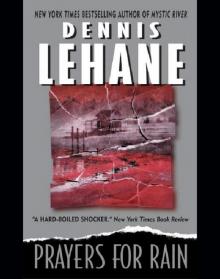 Prayers for Rain
Prayers for Rain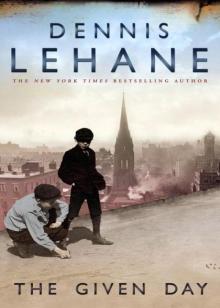 The Given Day
The Given Day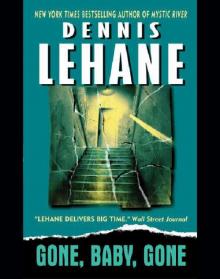 Gone, Baby, Gone
Gone, Baby, Gone Mystic River
Mystic River A Drink Before the War
A Drink Before the War Shutter Island
Shutter Island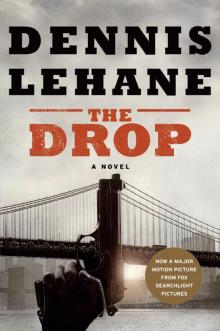 The Drop
The Drop Moonlight Mile
Moonlight Mile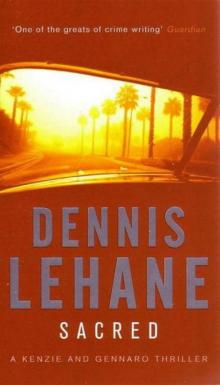 Sacred
Sacred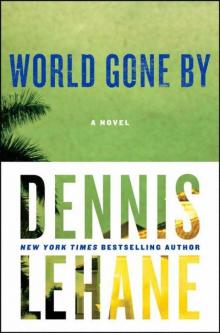 World Gone By
World Gone By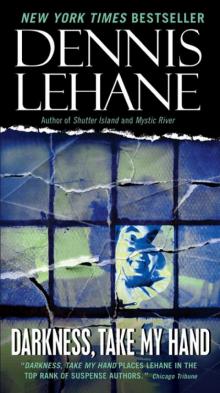 Darkness, Take My Hand
Darkness, Take My Hand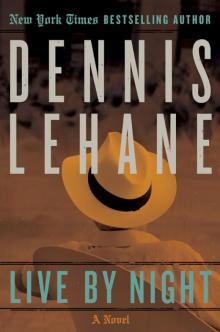 Live by Night
Live by Night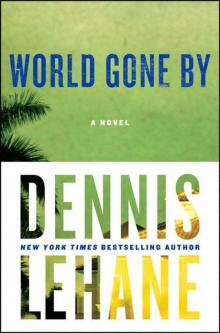 World Gone By: A Novel
World Gone By: A Novel Coronado
Coronado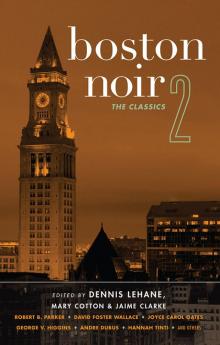 Boston Noir 2
Boston Noir 2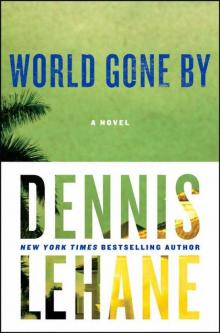 World Gone By: A Novel (Joe Coughlin Series)
World Gone By: A Novel (Joe Coughlin Series)